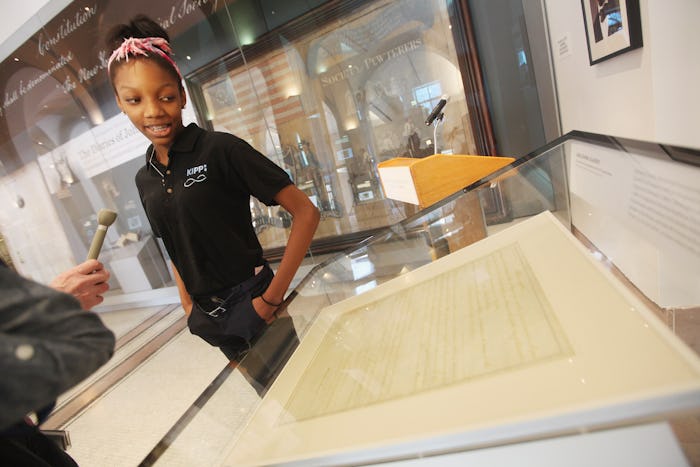News

The beginning of February is a time when many of us wonder how to celebrate Black History Month in a meaningful, valuable way. Sure, it's easy enough to take a moment or two to ponder the accomplishments of Martin Luther King Jr., or listen to celebrities talk about black history on cheesy promotional spots for media outlets, but, as Slate writer Aisha Harris pointed out in her essay "Let's Fix Black History Month", black history is about much more than just the accomplishments of "the usual suspects." Harris argues that if we're going to take a month to celebrate black history, we should take the time to "address the genuinely overlooked facets of black history" rather than just brush up on the basic facts of figures like Malcolm X and Harriet Tubman.
The origins of Black History Month are all about education, and the month was once just a week. In 1926, African-American historian Carter G. Woodson deemed the second week of February "Negro History Week." The chosen dates were a nod to Abraham Lincoln, who was born on Feb. 12, and Frederick Douglass, who was born on February 14. Woodson hoped that teachers in the public education system would devote the week to teaching their students about black history. "If a race has no history, it has no worthwhile tradition, it becomes a negligible factor in the thought of the world, and it stands in danger of being exterminated," Wilson wrote in 1935.
And so, in the interest of keeping history alive, here are some ideas for how to celebrate Black History Month appropriately.
Educate Yourself
Given that Black History Month began as a way to demand the teaching of black history in public schools, it seems logical that the best way to celebrate is, well, to read about black history. And given that the chosen month of February is a way to honor the birthdays of Abraham Lincoln and Frederick Douglass, a great place to start one's self-education would be with the writings of these luminous men.
But if you're looking for the lesser-known figures in black history, try Incidents in the Life of a Slave Girl, the autobiography of Harriet Jacobs, a celebrated woman in black history who escaped her masters, lived in a crawl space for seven years, escaped to New York, and became an abolitionist.
Read, Watch, Listen
History is a rich, deep tapestry that's made stitch by stitch. Just this week, The New York Times added to the tapestry by releasing previously unpublished images relevant to black history. Included among the photos is a close-up of actress and singer Lena Horne, a picture of a black girl and a white boy writing on the chalkboard in a recently integrated school in New Jersey, and a high school photo of basketball superstar Kareem Abdul-Jabbar.
Once you start looking, you realize there's so much out there to read, see, and hear. Check out the music of Joyce Bryant, the celebrated African-American jazz singer, or read about Bill Pickett, the African-American rodeo performer who, along with his four brothers, founded The Pickett Brothers Bronco Busters and Rough Riders Association in the 1890's. Yep, it really happened, and here's the book cover to prove it.
Celebrate Year-Round
Not everyone loves Black History Month, including actor Morgan Freeman, who once told a CBS interviewer that it's "ridiculous." (He really meant it, too. Like, really meant it. Watch the video.) The idea that black history can, or should, be singled out and compressed into a single month is understandably unpalatable to some, as is the fact that the month is highjacked by corporations to do things like sell beer and soft drinks.
Some argue that Black History Month needs to be singled out for a rather unfortunate reason: because the struggles of the African-American community in America are ongoing. The problems of the past have not been solved, and so it's especially important to continue to honor, learn about, and celebrate the history of a people that are, in some ways, still struggling for freedom.
Leslie Hinkson, an assistant professor of sociology at Georgetown University, explained to The Washington Post columnist Clinton Yates in 2013,
I think having Black History Month at this point in American history — I think it keeps all of us a little bit more aware that maybe something isn’t quite right. It’s something that I think is there to sort of push our subconscious, to understand that we need to keep moving forward.
With that in mind, perhaps the best way to honor Black History Month is to continue to learn about black history and the black present, year round, and no matter the month.
Learn Local History
USA Today editor Nichelle Smith believes that black history is shaped by the particular places and things that every individual encounters in their daily lives. In an essay introducing 'Hallowed Grounds,' a USA Today Black History Month feature about the forgotten places and spaces of black history, Smith wrote,
Few places hold memories more special to me than my hometown.Many people forget that the Great Migration of the last century made Gary, Ind., birthplace of Michael Jackson, a thriving destination for blacks escaping the Jim Crow South. Lost in the modern narrative of a steel city on hard times is Gary’s legacy as an inspirational center of black political power. That power reached its apex with the 1972 National Black Political Convention, where Richard G. Hatcher, one of the first black mayors of a major city, hosted 8,000 delegates and a who’s who of activists, from Amiri Baraka to Jesse Jackson, to set a national agenda for African Americans to address poverty, jobs and disenfranchisement.
A great way to honor Black History Month is to visit your local museum to learn about black history, or to talk to family, friends, or community leaders about their own memories. Because history is everywhere — you just need to know where to look.